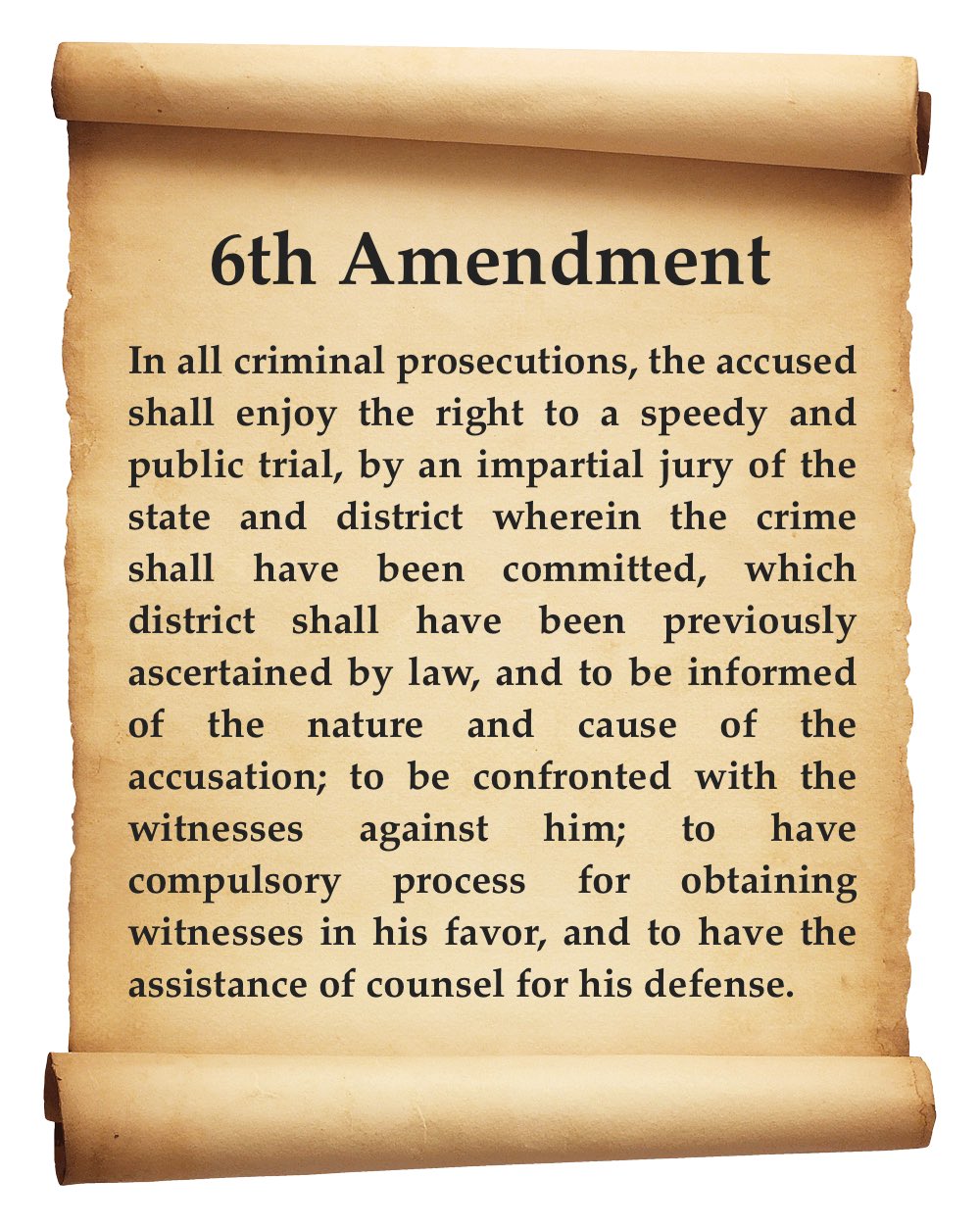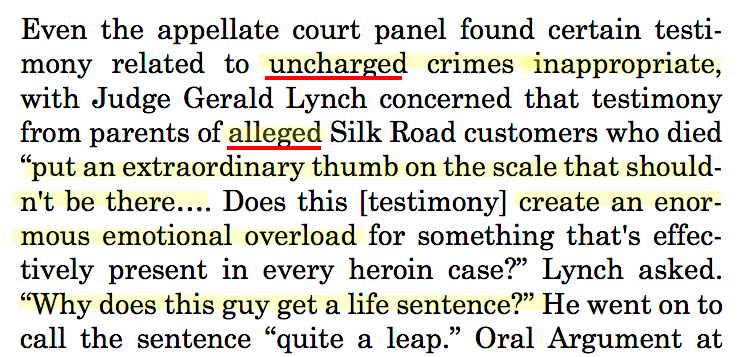Sixth Amendment Violations:
Uncharged Allegations Used at Sentencing
“The district court sentenced Ross Ulbricht to life without parole, the harshest punishment our legal system allows short of death. That sentence depended on facts that were never found by the jury.”
– Law Enforcement Action Partnership and Drug Policy Alliance in support of the Supreme Court petition.[1]
Americans are guaranteed a trial by jury by the Sixth Amendment, which states:
“In all criminal prosecutions, the accused shall enjoy the right to a speedy and public trial, by an impartial jury.”
– Sixth Amendment to the U.S. Constitution.[2]
The Sixth Amendment guarantees a trial by jury to protect the accused from a judge or prosecutor exercising unauthorized power.
These false allegations were eventually dismissed with prejudice years later, meaning that Ross is, in part, serving a double life sentence + 40 years based on now-dismissed allegations.
“The sentence was based on judicial findings related to allegations of serious crimes that not only were never found by a jury but were not even among the charges leveled at trial.”
– National Lawyers Guild and seven other organizations in support of the Supreme Court petition.[3]
A detailed 11-page forensic pathology report concluded that no cause of death could neither be scientifically determined nor linked to Silk Road.[5] The defense called the allegations “incomplete, unreliable and inaccurate”[6]
Even the Court of Appeals found some impact statements at sentencing inappropriate. Judge Gerald Lynch was concerned that parents’ testimony related to these deaths “put an extraordinary thumb on the scale that shouldn’t be there” at sentencing and created “an enormous emotional overload for something that’s effectively present in every heroin case.”[7] He asked “Why does this guy get a life sentence?” and went on to call the sentence “quite a leap”.[8]
“Given the nature and complexity of those issues–allegations including overdose deaths and drug quantities–it is far from clear that petitioner should be held responsible…He has the right to have a jury of his peers decide.”
– Law Enforcement Action Partnership and Drug Policy Alliance in support of the Supreme Court petition.[9]
This reliance on uncharged allegations and fact-finding by the judge—and not the jury—violated Ross’s constitutional rights. This type of judicial overreach has been debated over decades in the courts, and there is a long string of cases in which judges have violated the Sixth Amendment in this way. Ross’s sentence bolsters a destructive, unconstitutional precedent.
“In this extreme case, the system was gamed by the government, and the sentence imposed by the district court usurped and undermined the jury’s fact-finding prerogatives”.
– Downsize DC Foundation and five other organizations in support of the Supreme Court petition.[10]
References
- ▲[1] – Amicus brief from Drug Policy Alliance and Law Enforcement Action Partnership (page 3)
- ▲[2] – U.S. Constitution’s Sixth Amendment, Cornell Law School
- ▲[3] – Amicus brief from National Lawyers Guild, American Conservative Union Foundation, FreedomWorks, Human Rights Defense Center, Federal Judge Nancy Gertner, Coalition for Civil Freedoms, Partnership for Civil Justice Fund, and People’s Law Office (page 16)
- ▲[4] – Appeal brief (page 127)
- ▲[5] – Pathology report from Mark L. Taff, MD (page 10)
- ▲[6] – Appeal brief (page 130)
- ▲[7] – Reason article, October 7, 2016 (“Ross Ulbricht’s Silk Road Appeal: One Judge Seems to Question His Life Sentence without Parole”)
- ▲[8] – Amicus brief from National Lawyers Guild, American Conservative Union Foundation, FreedomWorks, Human Rights Defense Center, Federal Judge Nancy Gertner, Coalition for Civil Freedoms, Partnership for Civil Justice Fund, and People’s Law Office(page 19)
- ▲[9] – Amicus brief from Drug Policy Alliance and Law Enforcement Action Partnership (page 4)
- ▲[10] – Amicus brief from Downsize DC Foundation, Conservative Legal Defense and Education Fund, Gun Owners Foundation, Gun Owners of America, Inc., and Restoring Liberty Action Committee (page 4)


